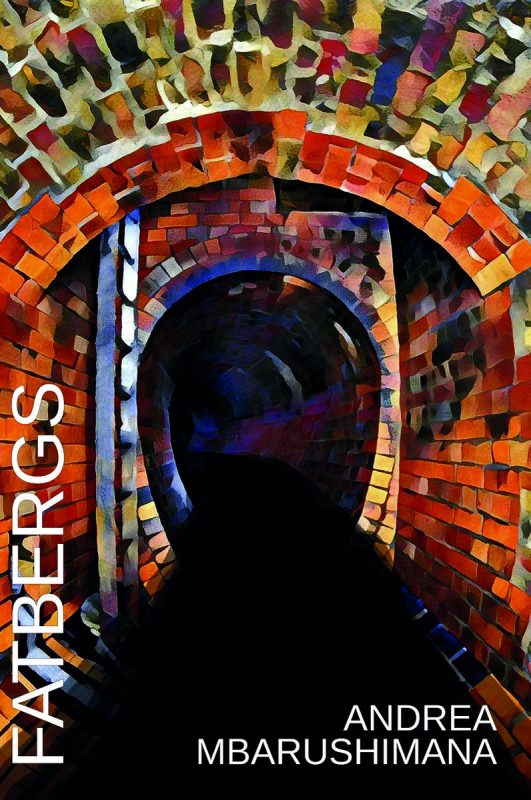REVIEW: ANDREA MBARUSHIMANA’S ‘FATBERGS’
Reviewed by Stella Backhouse

To the romantics among you, the modern menace of fatbergs, defined by Wikipedia as ‘a rock-like mass of waste matter in a sewer system formed by the combination of flushed non-biodegradable solids such as wet wipes, and congealed grease or cooking fat’, might not seem like an obvious fount of poetic inspiration. So, it’s hugely to Andrea Mbarushimana’s credit that she has not only confronted an urban phenomenon so unpalatable that most of us would prefer to not even think about it; but has turned it into a metaphor for modern life.
Fatbergs is a mixed collection, embracing snapshots of 2020’s lockdowns along with poems about sex, childhood experiences and nature – in particular, Andrea’s long-standing love of birds is again celebrated here. But enfolding it is its cover – an integral part of the book, painted by the poet herself. It depicts a brick-built sewer receding backwards to a realm of unknown horrors even as it vomits forwards to the reader its payload of black water. Its warning is clear: the ride ahead won’t be a comfortable one. Because, at its heart, this is a book about acknowledging that life as we know it depends on suppressing dark truths that lurk only just beneath the surface; and reckoning what the costs of that suppression might be.
In the tightrope-honest ‘Motherhood’, for example, a traditionally fulfilling role becomes “a behemoth of gradual accretion” where “you try to keep it together”, “every step feels perilous” and critics are always waiting to pick off bits of you. Meanwhile in ‘The Hoodie’, the poet at first turns away from “a huge black shape against the wardrobe door./A maw in the base of an old tree./A sewer.” But following a process of negotiation, accommodation is eventually reached: “I dress in shadows made of light./I choose to see you.”
The nature of the threat is, as in real life, multi-faceted. Drawing on personal experience of health issues and terminal illness amongst close family, a number of poems are balanced on the knife edge walked by every human body. In ‘Zero Hour’ malapropisms, spoonerisms and metatheses are deployed to convey a brain woozily fighting to maintain normal service amid sudden support-system malfunction: “I was sat at the chicken table,/lids in the kiving room,/hus-stairs upland”. ‘Cheyne-Stokes’, with its resumed/interrupted rhythms, captures the atmosphere of a room where a much-loved life hovers on the brink of death, never certain which breath will be the last.
But even if we succeed in moving beyond the personal, the existential threat posed by global heating still stalks the horizon. In ‘The Effect of Increasing Temperatures…’, Andrea ruefully recalls a summer twenty years ago, spent conducting scientific research on peat bogs in Scotland. But even though results confirmed “the book of the hillside opens, reads a prescient elegy”, alarm bells were not heeded and now “Mercury climbs and climbs and life runs quicker down the wrong fork in the river – cataract calling.”
Bringing these threads together is the idea of what is left behind. Fatbergs has no titular poem, but in ‘Thank God We Never Had Kids’ a hideous “golem of fat” made of casually discarded bodily secretions and bits of throwaway tat emerges from the toilet, calling for the people who made it. Elsewhere, the preserved heart of St Theresa of Avila is reverenced at the Spanish town of Alba de Tormes “despite her insistence that it belonged to the Almighty”; and collecting them from the care home where she died, Andrea is disappointed by the “toothlessness” of her aunt’s effects, their seeming disconnect from the person she was.
Fatbergs is a reminder that the bodies we inhabit are fragile entities that can let us down at any moment. In its open engagement with the messy, earthy business of physicality and bodily detritus, it put me in mind of Tracey Emin’s infamous piece of installation art My Bed. But in its plea to think carefully about the legacies we leave behind, both to each other and to the planet, it also reminded me of those quiet, calming notices you still sometimes see at beaches and beauty spots: ‘Kill nothing but time. Take nothing but pictures. Leave nothing but footprints.’
Fatbergs is available to purchase online from Knives Forks & Spoons Press.
